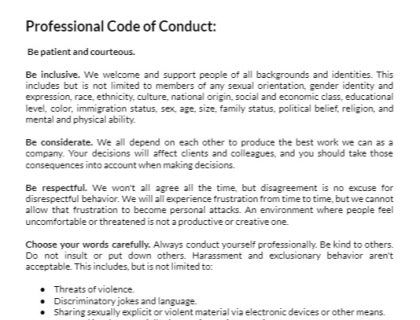
Code of Conduct Template Download:
Use our free template to create your own customized code of conduct.
Download NowYou can use the code of conduct sample text below to create your own code of conduct. Just copy and paste, and then add your own specific points.
Professional Code of Conduct:
Be patient and courteous.
Be inclusive. We welcome and support people of all backgrounds and identities. This includes but is not limited to members of any sexual orientation, gender identity and expression, race, ethnicity, culture, national origin, social and economic class, educational level, color, immigration status, sex, age, size, family status, political belief, religion, and mental and physical ability.
Be considerate. We all depend on each other to produce the best work we can as a company. Your decisions will affect clients and colleagues, and you should take those consequences into account when making decisions.
Be respectful. We won't all agree all the time, but disagreement is no excuse for disrespectful behavior. We will all experience frustration from time to time, but we cannot allow that frustration to become personal attacks. An environment where people feel uncomfortable or threatened is not a productive or creative one.
Choose your words carefully. Always conduct yourself professionally. Be kind to others. Do not insult or put down others. Harassment and exclusionary behavior aren't acceptable. This includes, but is not limited to:
- Threats of violence.
- Discriminatory jokes and language.
- Sharing sexually explicit or violent material via electronic devices or other means.
- Personal insults, especially those using racist or sexist terms.
- Unwelcome sexual attention.
- Advocating for, or encouraging, any of the above behavior.
Do not harass others. In general, if someone asks you to stop something, then stop. When we disagree, try to understand why. Differences of opinion and disagreements are mostly unavoidable. What is important is that we resolve disagreements and differing views constructively.
Our differences can be our strengths. We can find strength in diversity. Different people have different perspectives on issues, and that can be valuable for solving problems or generating new ideas. Being unable to understand why someone holds a viewpoint doesn’t mean that they’re wrong. Don’t forget that we all make mistakes, and blaming each other doesn’t get us anywhere.
Instead, focus on resolving issues and learning from mistakes.

